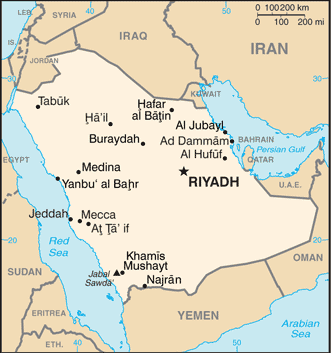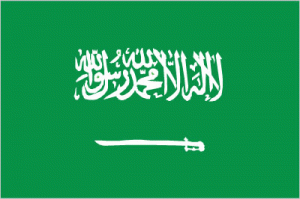Saudi Arabia
 Aglow Status: Restricted
Aglow Status: Restricted
(The term “Restricted Nation” as used in Aglow is a nation where it is difficult or dangerous to be a Christian. Therefore the status of Aglow in nations indicated as Restricted is withheld.)
Capital: Riyadh
Pray:
- Pray for all the resources and creativity needed to fulfill the intentions of God in the nation of Saudi Arabia.
- Pray for godly government leaders. Blessed is the nation whose God is The Lord, the people whom He has chosen for His own inheritance. Psalm 33:12
Proclaim:
- Arise, shine; for your light has come! And the glory of the LORD is risen upon you. For behold, the darkness shall cover the earth, and deep darkness the people; but the LORD will arise over you, and His glory will be seen upon you. Isaiah 60:1,2 (NKJV)
- Lift up your heads, O you gates! Lift up, you everlasting doors! And the King of glory shall come in. Who is this King of glory? The Lord of hosts, He is the King of glory. Selah Psalm 24:9-10 (NKJV)
Interesting Facts About Saudi Arabia
 Background: Saudi Arabia is the birthplace of Islam and home to Islam’s two holiest shrines in Mecca and Medina. The king’s official title is the Custodian of the Two Holy Mosques. The modern Saudi state was founded in 1932 by ABD AL-AZIZ bin Abd al-Rahman Al SAUD (Ibn Saud) after a 30-year campaign to unify most of the Arabian Peninsula. One of his male descendants rules the country today, as required by the country’s 1992 Basic Law. Following Iraq’s invasion of Kuwait in 1990, Saudi Arabia accepted the Kuwaiti royal family and 400,000 refugees while allowing Western and Arab troops to deploy on its soil for the liberation of Kuwait the following year. The continuing presence of foreign troops on Saudi soil after the liberation of Kuwait became a source of tension between the royal family and the public until all operational US troops left the country in 2003. Major terrorist attacks in May and November 2003 spurred a strong ongoing campaign against domestic terrorism and extremism. US troops returned to the Kingdom in October 2019 after attacks on Saudi oil infrastructure.
Background: Saudi Arabia is the birthplace of Islam and home to Islam’s two holiest shrines in Mecca and Medina. The king’s official title is the Custodian of the Two Holy Mosques. The modern Saudi state was founded in 1932 by ABD AL-AZIZ bin Abd al-Rahman Al SAUD (Ibn Saud) after a 30-year campaign to unify most of the Arabian Peninsula. One of his male descendants rules the country today, as required by the country’s 1992 Basic Law. Following Iraq’s invasion of Kuwait in 1990, Saudi Arabia accepted the Kuwaiti royal family and 400,000 refugees while allowing Western and Arab troops to deploy on its soil for the liberation of Kuwait the following year. The continuing presence of foreign troops on Saudi soil after the liberation of Kuwait became a source of tension between the royal family and the public until all operational US troops left the country in 2003. Major terrorist attacks in May and November 2003 spurred a strong ongoing campaign against domestic terrorism and extremism. US troops returned to the Kingdom in October 2019 after attacks on Saudi oil infrastructure.
From 2005 to 2015, King ABDALLAH bin Abd al-Aziz Al Saud incrementally modernized the Kingdom. Driven by personal ideology and political pragmatism, he introduced a series of social and economic initiatives, including expanding employment and social opportunities for women, attracting foreign investment, increasing the role of the private sector in the economy, and discouraging businesses from hiring foreign workers. These reforms have accelerated under King SALMAN bin Abd al-Aziz, who ascended to the throne in 2015, and has since lifted the Kingdom’s ban on women driving and allowed cinemas to operate for the first time in decades. Saudi Arabia saw some protests during the 2011 Arab Spring but not the level of bloodshed seen in protests elsewhere in the region. Shia Muslims in the Eastern Province protested primarily against the detention of political prisoners, endemic discrimination, and Bahraini and Saudi Government actions in Bahrain. Riyadh took a cautious but firm approach by arresting some protesters but releasing most of them quickly and by using its state-sponsored clerics to counter political and Islamist activism.
The government held its first-ever elections in 2005 and 2011, when Saudis went to the polls to elect municipal councilors. In December 2015, women were allowed to vote and stand as candidates for the first time in municipal council elections, with 19 women winning seats. After King SALMAN ascended to the throne in 2015, he placed the first next-generation prince, MUHAMMAD BIN NAYIF bin Abd al-Aziz Al Saud, in the line of succession as Crown Prince. He designated his son, MUHAMMAD BIN SALMAN bin Abd al-Aziz Al Saud, as the Deputy Crown Prince. In March 2015, Saudi Arabia led a coalition of 10 countries in a military campaign to restore the legitimate government of Yemen, which had been ousted by Huthi forces allied with former president ALI ABDULLAH al-Salih. The war in Yemen has drawn international criticism for civilian casualties and its effect on the country’s dire humanitarian situation. In December 2015, then Deputy Crown Prince MUHAMMAD BIN SALMAN announced Saudi Arabia would lead a 34-nation Islamic Coalition to fight terrorism (it has since grown to 41 nations). In May 2017, Saudi Arabia inaugurated the Global Center for Combatting Extremist Ideology (also known as “Etidal”) as part of its ongoing efforts to counter violent extremism. In June 2017, King SALMAN elevated MUHAMMAD BIN SALMAN to Crown Prince.
The country remains a leading producer of oil and natural gas and holds about 16% of the world’s proven oil reserves as of 2015. The government continues to pursue economic reform and diversification, particularly since Saudi Arabia’s accession to the WTO in 2005, and promotes foreign investment in the Kingdom. In April 2016, the Saudi Government announced a broad set of socio-economic reforms, known as Vision 2030. Low global oil prices throughout 2015 and 2016 significantly lowered Saudi Arabia’s governmental revenue. In response, the government cut subsidies on water, electricity, and gasoline; reduced government employee compensation packages; and announced limited new land taxes. In coordination with OPEC and some key non-OPEC countries, Saudi Arabia agreed cut oil output in early 2017 to regulate supply and help elevate global prices.
Government Type: absolute monarchy
Population: 34,783,757 (July 2021 est.)
Ethnic Groups: Arab 90%, Afro-Asian 10%
Languages: Arabic (official)
Religions: Muslim (official; citizens are 85-90% Sunni and 10-15% Shia), other (includes Eastern Orthodox, Protestant, Roman Catholic, Jewish, Hindu, Buddhist, and Sikh) (2012 est.)
Interesting Facts information from the cia.gov website. Read more about Saudi Arabia
